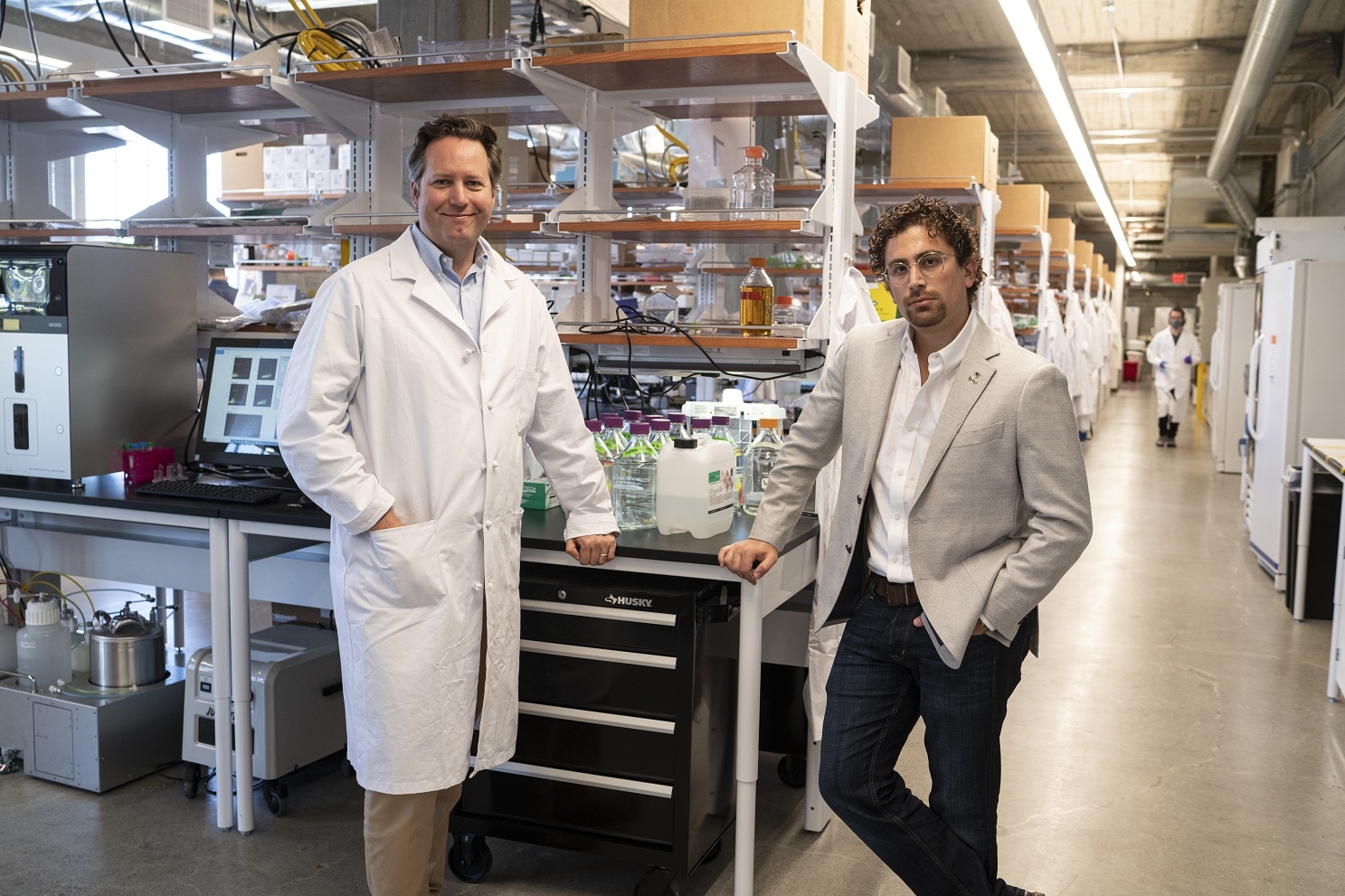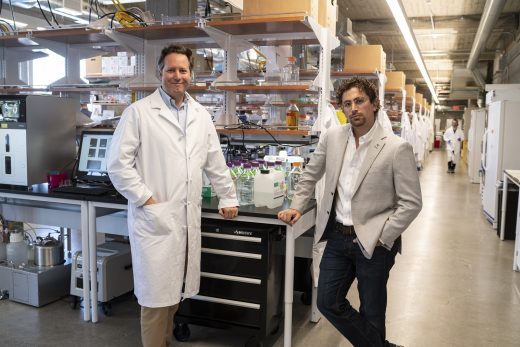Scribe Therapeutics Sets Out to Write CRISPR Gene Editing’s Next Chapter

The first generation of CRISPR-based therapies showed how the technology can edit DNA, making genetic fixes to unwanted mutations. But those treatments use the CRISPR system as scientists found it in nature, which means it still has limitations when applied to humans, says Benjamin Oakes, CEO of Scribe Therapeutics.
Scribe aims to develop gene-editing therapies that improve CRISPR’s efficacy, safety, and deliverability to target cells. Oakes says Scribe can achieve these goals with technology that imbues a therapy with whatever attributes will make it best suited for a particular application. More than taking what nature provides, Scribe engineers molecules to what is needed.
“What makes that possible is we can start with the molecular clay and engineer every change imaginable into that molecule,” says Oakes (pictured above, right). “We can actually create the molecule that you would want for therapeutic use.”
Alameda, CA-based Scribe has been developing its technology quietly for the past two years. On Tuesday, the startup emerged to reveal details about its research as well as a partnership with Biogen (NASDAQ: BIIB) that is focused on treatments for neurological disorders.
Scribe’s science is based on the research of CRISPR pioneer Jennifer Doudna. In 2018, the startup launched from Doudna’s University of California at Berkeley lab, the Oakes Lab, and the Innovative Genomics Institute. Cas9, the DNA-cutting enzyme used in currently available gene-editing therapies as well as in some therapies still in development, is a powerful molecule but it’s not the right tool for all applications, Oakes says.
For in vivo editing—edits made inside a patient—Cas9’s size makes it a poor fit for the adeno-associated virus (AAV) used to deliver a therapy. The first patient to receive an in vivo gene-editing therapy was dosed earlier this year in a Phase 1/2 study testing an experimental Editas Medicine (NASDAQ: EDIT) treatment for Leber congenital amaurosis 10, a rare inherited form of blindness. That therapy uses Cas9 packaged in an AAV and it’s injected directly into the retina, which means that delivery to the target tissue is not a problem. But as the field looks to expand in vivo gene editing to other diseases in other parts of the body, drug developers will need to ensure that a therapy reaches its intended target. Other challenges include reducing the risk of off-target edits. Oakes says that solving for one of these problems can lead to tradeoffs that diminish other aspects of a therapy.
Scribe works with CasX, a CRISPR protein discovered in Doudna’s lab. Its smaller size compared to Cas9 makes it a better fit for the engineered viruses used for in vivo gene-editing applications. That molecule became the foundation for Scribe’s X-Editing technology, or XE. This platform enables the company to custom engineer CRISPR enzymes, selecting for particular characteristics. The company calls XE its first technology. Oakes says the company will develop other technologies that could improve how DNA is inserted. In addition to improving the delivery of gene-editing therapies to specific tissues or cell types, Scribe also wants to ensure that the therapy stays in those places only as long as necessary to reduce the chance of an unwanted edit.
“We want to enable therapy to modify disease and then no longer exist,” after it’s done its work, Oakes says. “There’s no reason to be there. We’re very focused on both where and when, or how long our delivered therapeutic modality will be around for.”
Scribe’s preclinical research has shown that its technology can delivery AAV gene-editing therapies to targets in the central nervous system. That capability caught the eye of Biogen, which is now partnering with Scribe to develop CRISPR-based therapies for the genetic causes of amytrophic lateral sclerosis. The companies will also work together to develop a therapy addressing another neurological disease that will be selected by Biogen. The Cambridge, MA-based drug maker is paying the startup $15 million up front, with the potential for up to $400 million in milestone payments pegged to the progress of both programs. If Biogen is able to commercialize those therapies, the agreement calls for the company to pay Scribe royalties from sales.
Scribe is looking for other partners that offer synergies with the company’s internal research, which focuses on developing treatments for neurological diseases. The startup is also developing an internal pipeline of in vivo gene-editing therapies, but Oakes says it’s too soon to say when the company might reach clinical testing.
At its launch, Scribe was backed by $20 million in Series A financing from Andreesen Horowitz and other undisclosed investors. With the upfront payment from Biogen, Oakes says his company does not need to raise money now but will be looking for additional financing in the future.
(27)


